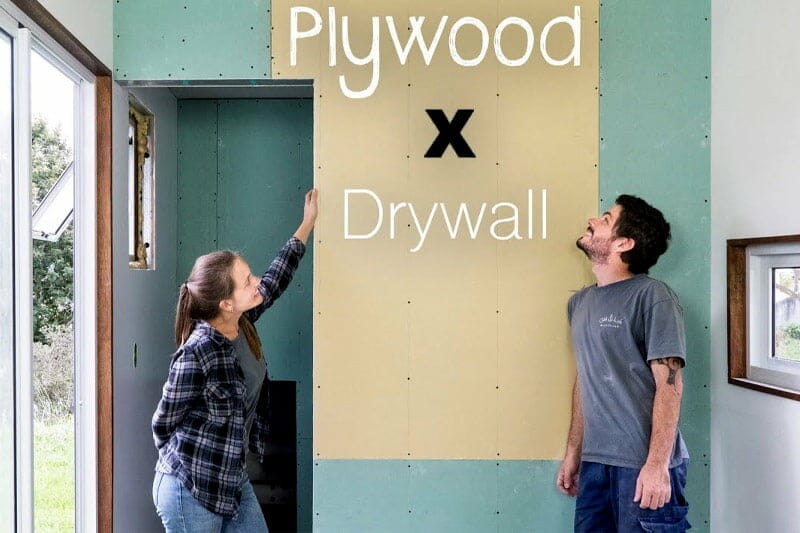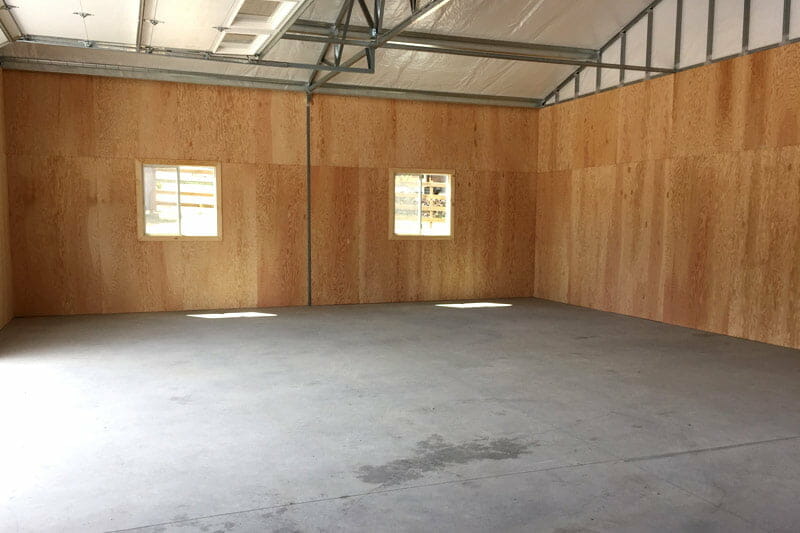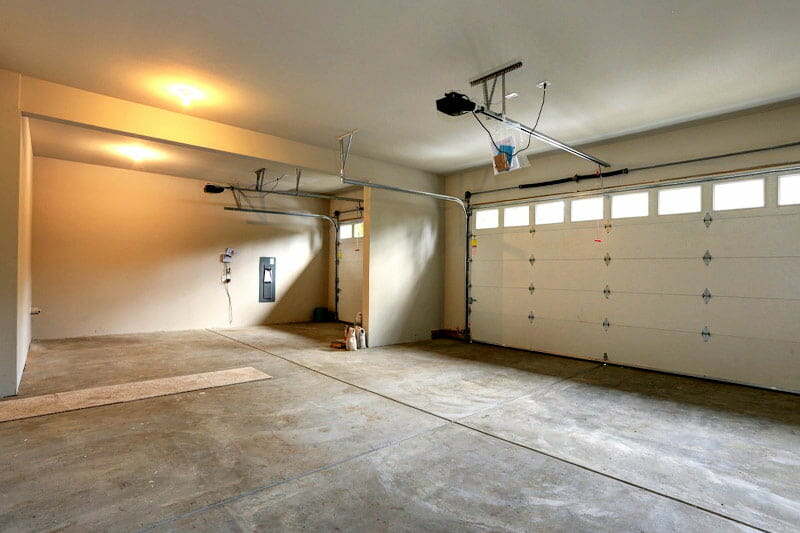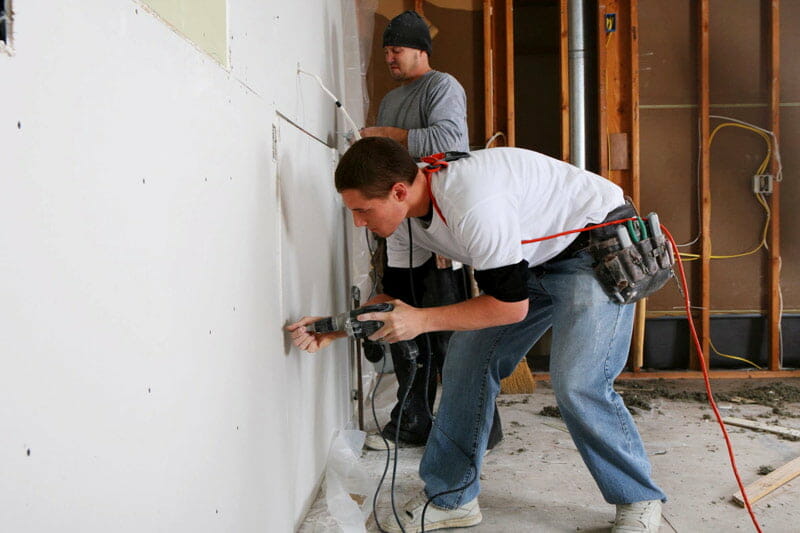Plywood and drywall often find their way into construction endeavors, becoming the materials of choice for many builders. While they might fulfill similar roles, choosing between them ultimately hinges on the unique demands of each project.
We compare the two to give you an overall winner, but the application and project are going to determine which is best for you.
Deeper analysis below the table
| Plywood | Drywall | |
|---|---|---|
| Strength | Winner | Loser |
| Cost | Loser | Winner |
| Ease Of Installation | Winner | Loser |
| Fire resistance | Loser | Winner |
| Repairs | Loser | Winner |
| Aesthetic appeal | Tie | Tie |
| Soundsproofing | Loser | Winner |
| Moisture resistance | Loser | Winner |
| Structure | Winner | Loser |
| Total | Loser | Winner |

Difference Between Plywood and Drywall
Strength
Plywood is made from wood. Gypsum consists of 50% water. Consequently, plywood is stronger than drywall.
Thus, if you are building a wall that will need to hold heavy items and decorations, plywood is the best material for the task.
Due to its strength, plywood will last longer than drywall when installed.
The strength of plywood makes it ideal for a garage wall. You can keep your garage neat by hanging your tools and other items on the plywood wall.
Winner – Plywood
Cost
Construction projects require sizeable budgets. You purchase materials based on how much money you have. Depending on the project, you can use drywall or plywood interchangeably to meet your budget.
Drywall is cheaper than plywood. Drywall costs between $1.5 – $3 for purchase and labor.
Plywood costs $3.5 – $7 per square foot. Using plywood could exceed your budget depending on the type and number of panels you need.
Winner – Drywall
Ease Of Installation
A panel of plywood is lighter than a panel of drywall. Therefore, it is much easier to install and work with than drywall.
Additionally, you can use fasteners such as nails on plywood without breaking it.
Due to its weight, you will need at least two people to complete a drywall installation. Additionally, installing drywall is a long process with many steps to follow.
You only need to fasten plywood in place for an easy and fast installation. Depending on the size of your garage, the installation will be quick and your garage ready to use.
Winner – Plywood
Fire Resistance
Drywall is more fire-resistant than plywood. The water component of drywall prevents the spread of fire.
Plywood consists of thin sheets of wood that are not fire-resistant. Wood catches and spreads fire fast.
Building codes recommend the use of drywall in parts of the home considered at fire risk.
Winner – Drywall
Repairs
It is easier to repair drywall than plywood. When parts of the drywall are damaged, all you need is drywall mud, a utility knife, and tape.
Apply the drywall mud on parts that need repair and smooth it over. You can repaint the repaired section and restore it in just a few minutes.
As much as it is easier to repair drywall, it is also much easier to damage than plywood.
Wood is difficult to repair. It is stronger and more durable than drywall and will take longer to damage.
In a garage, you will need to store heavy tools and carry out tasks that may hit the wall. You need a strong plywood wall to withstand this and prevent any damage.
Plywood is still usable when slightly damaged. However, extensive damage will have you to replace the whole panel.
Winner – Drywall
Aesthetic Appeal
When left bare, plywood is more attractive than drywall. Finished plywood has natural decorations and patterns left on it by wood grain.
Drywall is easy to decorate and enhances the aesthetics of your home. Before you paint it, it provides you with a bare surface. You can paint it in your favorite colors or apply wallpaper. You can also create textures on the surface of the drywall.
Winner – It depends on personal preference
Soundproofing
Drywall is better at soundproofing than plywood. You may need two layers of drywall for effective soundproofing. The layers of fiber and gypsum in the drywall absorb any noise effectively.
Wood is not a soundproof material. If you install plywood, noise from outside will easily get into your home.
Winner – Drywall
Moisture
Plywood reacts badly to moisture. Moisture may cause it to weaken and rot. Indoor plywood is not treated with chemicals to make it water-resistant. Do not install plywood in areas of the home that expose it to large quantities of water or moisture.
You can purchase moisture, mold, and mildew-resistant drywall. Even so, don’t install drywall in areas where it is likely to get wet without sufficient protection. If the drywall becomes too wet, it may weaken and collapse.
Winner – Drywall (Specifically Green or Purple board drywall which is moisture, mold, and mildew resistant)
Structure
Plywood is a wooden panel made of layers of thin wood known as plies. These plies are bonded together with an adhesive to strengthen them and make them usable in construction.
There are different types of plywood you can buy depending on its size and your preference.
Drywall consists of a mixture of gypsum, fibers, additives, and water. The mixture is then left to dry between two sheets of thick paper. Drying this mixture makes it a solid panel used for building.
Winner – Depends on the application
Pros and Cons of Plywood
Pros
- It is strong and durable.
- It is easy to install.
- It doesn’t damage easily.
- You can hang items on the plywood wall without damage to the wall.
- You don’t have to paint it. It has a naturally attractive finish due to the wood grain. You can apply a thin coat of varnish to protect it.
- Easier to transport
- Available in different sizes, prices, and gauges.
- Better moisture resistance

Cons
- When it gets damaged, you will have to replace the whole panel
- It is expensive to purchase and install
- It’s not fire-resistant. Garage building codes require that garage walls be fire-resistant.
- Can be attacked by pests
Pros and Cons of Drywall
Pros
- Heavy impact on the drywall in the garage may cause damage. The damage on drywall is easy to repair.
- Cheaper than plywood
- No price fluctuations in the market
- Fire resistant
- Easy to paint and decorate

Cons
- Difficult to install due to its weight
- Not long-lasting
- Easy to damage in case of impact
- Cant hang heavy items on the drywall in the garage
- Heavier than plywood
Factors To Consider When Choosing Drywall Or Plywood For Your Garage
Climate
When choosing between drywall and plywood, you need to consider the climate in your area. Is the area you live in dry or wet?
If the climate is dry, you can install drywall. Due to its reaction to moisture, do not install drywall in wet climate areas.
Plywood is mostly moisture-resistant. It can withstand high levels of moisture in the environment since it dries quickly.
Drywall is likely to weaken when installed it gets wet. However, if your garage is waterproof you can install drywall.
Building Code For Garage In Your Area
Garage renovations must follow the building code in your area. Depending on where you live, the building code will stipulate whether you can use plywood or drywall.
The first consideration of the building code for your garage is the location. If the garage is adjacent to living areas, you must install fire-resistant drywall. The building code also indicates the size of drywall you need to install in your garage.
If you prefer to install plywood in your garage, the building code indicates the type of plywood you need to install. The plywood types rated B are more fire-resistant and meet the building code.
Budget
Whenever you are renovating your garage, you must budget for the process. Involve a professional builder in the budget creation process.
Drywall is the best material to install in your garage if you have a limited budget.
Drywall is considerably cheaper than plywood. The price of plywood fluctuates and depends on the availability of wood.
If your budget is for plywood, you will need to keep an allowance for an increase in price based on the fluctuating market prices.
The price of drywall does not fluctuate. You can create your budget and complete your renovation without deviating from the budget.
Size Of Garage
When choosing between drywall and plywood, consider the size of your garage. When considering the size of your garage, consider the cost of installation of either plywood or drywall.
Drywall is cheaper than plywood. Installing it minimizes how much you spend on the renovation.
If you have a small garage, you will need to hang some of the items in the garage on the wall. A plywood wall is strong and can handle tools hanging from it. You cannot hang tools on drywall.
If your garage has ample space, you can install drywall. It is easy to paint and decorate. It also allows you to place items on the floor around the garage.
Soundproofing
Depending on how you use the garage, you may need to soundproof it.
Drywall is the best material to use when you want to minimize noise. However, a single layer of drywall is insufficient. You will need a minimum of two layers of drywall to keep the noise in the garage from going to the adjacent rooms.
You will need green glue to join the two layers of gypsum and enhance their soundproofing capabilities. It is easy to buy and commonly used for soundproofing projects.
You can also use acoustic putty to seal cracks and crevices that leak sound.
Fire hazard
A garage that connects to a home can be a fire hazard as the garage is where we store petrol power machines and other flammables such as paint stripers and all sorts of chemicals. For this reason, it is a good idea to use X-Type drywall that is fire-resistant. This will help prevent your whole home from burning down if you have an isolated fire in your garage.
DIY Or Hire A Pro
While it is easy to install plywood due to its lightweight, it is better to hire a pro to recommend and install it. It saves you time and ensures that the job is well done.
The drywall is heavy. Installing it is a two-person job. Similarly, hiring a pro is better than installing it without the skills. Drywall requires more knowledge and tools to install than plywood.
It needs specialized fasteners and tools to work with drywall. Only professional drywall installers will do it correctly.
You can opt for DIY drywall installation if you have the tools, knowledge, and time to do it.

How To Hire A Pro
Homegardenguides.com is a free tool to connect homeowners to professional plywood and DIY installers.
At the top, enter your zip code in the provided space.
Then, fill in the subsequent. Provide details about the size and purpose of the room you want to have installed with drywall or plywood. Hit the submit button.
You will then receive three or more quotes from professional installers near you,
You can choose to hire either of them.
FAQ's
Stain, matte, and semi-gloss are some of the best paints to use on your garage wall. Semi-gloss paints are too shiny but are a good option for your garage. Satin paints are too smooth. However, they are easy to clean and are suitable for a busy garage. You can choose any color that you prefer to paint your garage.
Drywall is easier to paint than plywood. If you choose plywood for your garage walls you can apply a clear varnish.
Plywood has better insulation capabilities compared to drywall. ½ inch of plywood has an insulation R-value of 0.62. ½ inch drywall has an insulation R-value of 0.45.






